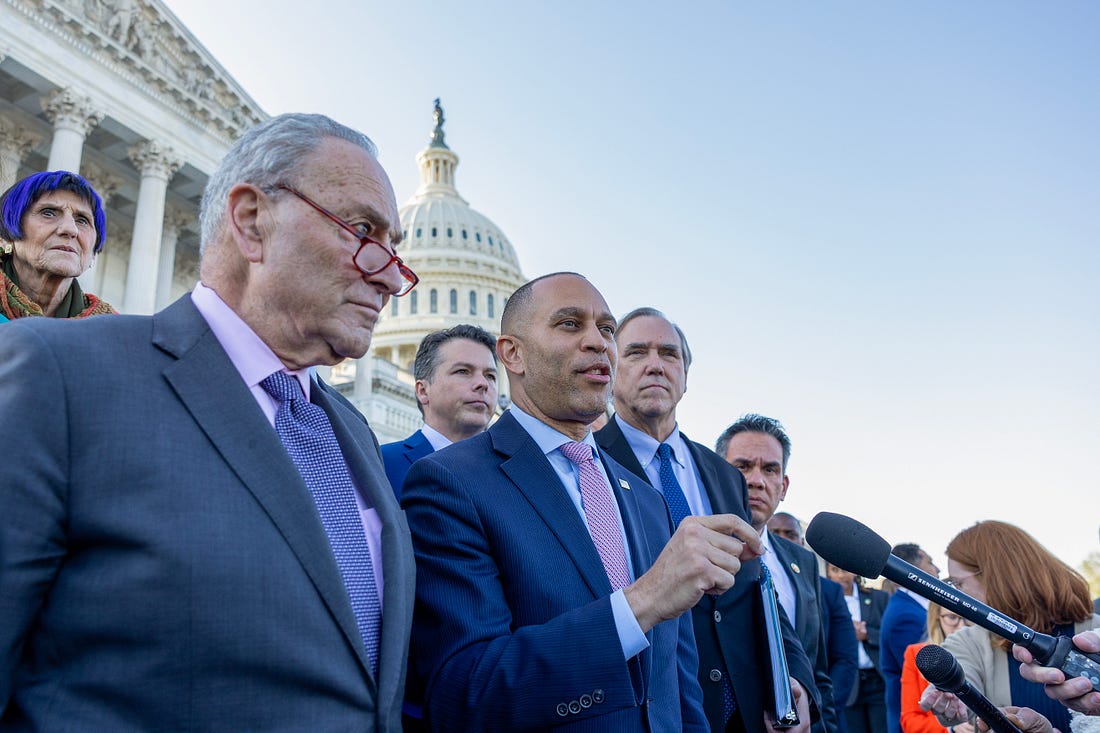|
 |
Trump Is Right: The Filibuster Should Die
A broken clock is right twice a day. This time he’s right about a broken legislative process.
There are elections tonight, you may have heard. Not only will we get new governors-to-be in Virginia and New Jersey and a new mayor-elect in New York City, we will also get our first really clear sense of what direction the Democratic party is heading. Among the questions to answer: Will centrist Democratic candidates for governor prosper in Virginia and New Jersey? Will Virginians really cast ballots for a guy who fantasized about the murder of a Republican lawmaker and his children? Will congressional redistricting go forward in California? Exactly how excited are New Yorkers over the last-minute endorsements Andrew Cuomo received from [checks notes] Donald Trump, Elon Musk, and Stephen Miller? And, of course, can Bill Ackman literally tweet through a Zohran Mamdani victory—and how long will those tweets be?
We’ll be covering it live at 8:00 p.m. Eastern on YouTube and Substack, so please do join us. Happy Friday.
Down With the Filibuster
by Andrew Egger
Donald Trump has his sights on the filibuster—ranting about it as recently as 8:21 a.m. this morning. The Senate’s longstanding convention requiring sixty votes to pass most legislation, the president grumbles, is a kink in the hose of his governing agenda, one that lets the Democratic minority stop most of the bills he wants to pass and even shut down the government by withholding their votes. His solution: Republicans should just abandon the filibuster altogether, which they could do pretty easily: All it takes is fifty votes.
Hey. When he’s right, he’s right.
In recent years, it has typically been progressives who have chafed at the filibuster. The 2021 book Kill Switch, written by Adam Jentleson, who served as a top staffer for Senate Majority Leader Harry Reid in the 2010s, laid out the argument: In Jentleson’s telling, the filibuster is a pointless vestigial mechanism that has never been good for anything but paralyzing lawmaking. Trying to pass legislation in the modern Senate is like trying to drive down the interstate with the emergency brake on.¹
Many conservatives have long responded by saying: Yeah, buddy, that’s the point. Passing new laws should be a struggle even during single-party control of D.C.: Giving the minority at least a small say in shaping policy is a safeguard against the too-rapid, too-partisan reworkings of the U.S. code.
I’m a conservative myself, a believer in the virtues of slow, careful change. In other words, I am pretty much the target audience for this argument. But lately I’ve been wondering whether it’s been rendered obsolete by recent events.
When you look around the country right now, do you see a federal government whose policy regime is being held judiciously in check by minority-respecting Senate procedures? Of course not. Instead, Congress sits gridlocked and the president runs the country by fiat, helping himself repeatedly to powers that rightly belong to the legislature. He has claimed authority to set government spending levels wherever he likes, to levy any tariffs he likes, to commit acts of war against any country he likes, to decline to enforce laws of Congress (like the TikTok ban) whenever he likes. Gridlock has enervated our legislators, made them lazy: Trump might as well grab those powers; it’s not like we were using them anyway.
Meanwhile, the Senate’s filibuster-induced gridlock has given significant political cover to Trump’s Let’s just do it and be legends populist pitch. The jalopy that is Congress is struggling laboriously down the highway, fighting the brake, smoke puffing ominously from under the hood—and here comes Trump, saying, “Come on, baby, you ever been on a motorcycle?”
Other supposed benefits of the filibuster keep conspicuously failing to materialize. In theory, the sixty-vote legislative threshold is supposed to induce some bipartisanship. Meanwhile, we’re breaking the record for longest government shutdown.
There are better arguments for the filibuster—including that it does still frustrate some parts of Trump’s agenda. And of course this is the reason Trump wants to do away with it. But the filibuster constrains the president only in ways that are distorted and strange. The only major policy bills that make it through the Senate these days are passed via the odd auxiliary method of budget reconciliation, which lets the Senate dodge the filibuster for certain bills that deal with federal spending and revenues. In practice, this system perversely ties Trump and his lawmakers more closely together, since the only hope for getting anything significant passed is to graft it onto one of the major reconciliation packages, like the One Big Beautiful Bill, that the president spearheads and promises to sign.
Whatever Chesterton’s-fence conservatives like me might prefer, the era of swift, radical political change is upon us. So the question now becomes: Who will develop, deliver, and set the course of that change? Will it be Congress, or will it be the president? Speaking for myself, I’ve had my fill and plenty more of the latter option; I’d like to see a world where the legislators get a say—and with the voters getting to render their judgements every two (as opposed to four) years. And that means a world where we reevaluate the structures that have helped tip the balance of power so far toward the executive. Maybe there was a time when Congress getting too muscular with its lawmaking was a real political concern. That’s not the situation in which we find ourselves today.
In a fight between Donald Trump and Senate Majority Leader John Thune, I’d take the Thune side 99 times out of 100. But when it comes to the filibuster, Thune is a general fighting the last war. Why not take a little power back for Congress, John? You’re the ones who are supposed to have it in the first place.
